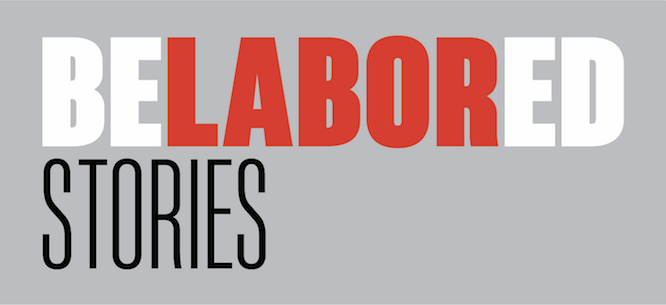Belabored Stories: The Buses Are Busy in the South Bronx
Belabored Stories: The Buses Are Busy in the South Bronx
Wayne Lizardi’s route is operating on a reduced schedule, but his bus is still crowded with passengers traveling to work.

[contentblock id=coronavirus]
Belabored is a labor podcast hosted by Sarah Jaffe and Michelle Chen. Belabored Stories, a new feature, will present short accounts of what workers are facing during the coronavirus pandemic. Send us your stories at belabored@dissentmagazine.org
Before the coronavirus crisis hit New York, the Metropolitan Transportation Authority (MTA) was running massive budget shortfalls, groaning under monstrously crowded subway cars, and wrestling with chronic service delays that could add hours to daily commutes. But now the quotidian frustrations of the under-resourced system have yielded to an eerie sense of foreboding among transit workers in the epicenter of the pandemic. As of late April, more than sixty transit workers had died of COVID-19 and thousands had tested positive for the virus.
Transit ridership, meanwhile, has plummeted, and subway and bus service has been cut sharply. But the workforce—comprised largely of working-class people of color—keeps showing up to help get the city’s essential workers to their jobs, despite the health hazards.
Charles Quinn, a custodial worker for the Long Island Railroad (LIRR), sanitizes the rails, doorknobs, and escalators on each platform twice a day. Though the LIRR has provided protective gear like gloves and masks, he said, “Still, in the back of your mind, you don’t want to bring it home to your family. I have two young girls, ages fifteen and ten, and I don’t want to bring it home to them.”
Since the commuter rails are considered essential infrastructure, he said, “we put ourselves at risk everyday when we go to work. The jobs that we have—it’s a task that you’ve got to do. . . . We were all given great training. [But] it’s scary.”
At the other end of the transit map, in the South Bronx, bus operator Wayne Lizardi is operating on a reduced schedule, but his bus is still crowded. He assumes this is because, in contrast to the relatively empty affluent neighborhoods like Midtown, people in the South Bronx are still working during the lockdown.
Lizardi still drives many workers to the Hunts Point market, for example, which is still a key supplier to local supermarkets. “And there’s a lot of hospitals where we cover as well,” he said, “so those workers need to get there. And then also, the people that we serve need to get to the pantries and stuff and get their food. So we’re very busy.”
At the depot, he said, the atmosphere is “very, very tense,” and workers have expressed anger and frustration with the health risks the workforce are forced to brave every day. After several weeks of sporadic mask wearing, on April 17 the MTA finally made masks mandatory for its employees. That rule should have been in place three weeks earlier, Lizardi said.
The week before Lizardi spoke with Dissent, a fellow bus operator—a father of five—died from COVID-19. “That was a shock,” he said, noting that while there is an underlying awareness among bus operators that many of their coworkers are having to call out sick, those illnesses and deaths are not widely announced. News circulates quietly among workers. “It’s not like they’re throwing everybody’s names around. . . . It’s more hearsay,” he said. “But bus operator McKnight was one of the ones that did pass away from that. Once that happened, the word got out.”
Currently, city buses are trying to minimize infection risk by putting barriers around the driver and directing people to enter from the rear door, rather than the front. But when the bus is crowded, it’s crowded. Lizardi said that ideally, customers would also wear masks when they board his bus, but it’s not up to him to police his passengers.
“I leave it up to the customers,” he mused. “I mean, if they don’t feel comfortable with somebody getting on the bus, they’re going to say something. This is the South Bronx! They’re going to say, ‘where’s your mask?’ . . . So, you let the public handle the public sometimes.”
For now, Lizardi is resigned to the routinized chaos of his bus route.
Am I nervous? I’m definitely nervous. Are all of us nervous? We’re all nervous getting on this bus and taking this bus out. . . . I believe transit is doing a great job of disinfecting these buses every day. I see [maintenance workers] out with the hazmat, they’re wiping everything down, they’re doing what they need to do. But once we take that bus out and there’s sixty people on it for one trip—[multiply] that by how many trips I do—we’re talking about 1,000 people I’m moving in a day. I don’t know which ones have this virus.
And workers never know how close the virus will strike next time. His father, also a longtime bus driver and retired union member, died in early April of COVID-19.
“This is something that we’ve . . . never experienced before,” he said. “And hopefully, we don’t experience again. Maybe it’s one of these hundred-year things. I don’t know. What’s up is down, what’s left is right, and it’s very strange.”
Michelle Chen is a member of Dissent‘s editorial board and co-host of its Belabored podcast.






